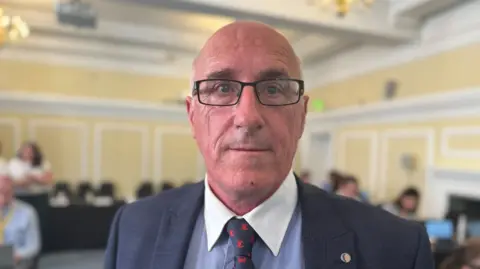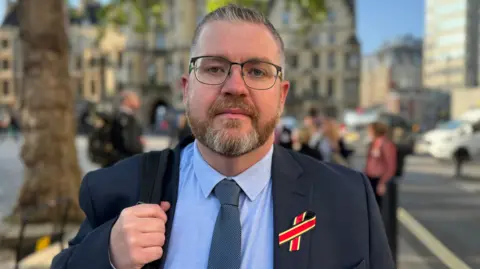Infected blood compensation confusion for NI victim
 BBC
BBCThe infected blood compensation scheme announcement is "confusing", a victim from Northern Ireland has said.
The UK government said interim payments of £210,000 will be paid within 90 days, while the final scheme becomes operational.
Nigel Hamilton, 63, who has haemophilia and contracted Hepatitis C after receiving contaminated blood products, said there are no details about categorisation of victims.
"I am concerned, the government have given little information - who will receive the interim payment first? It is very confusing."
He was listening to the announcement in London on Tuesday.
When announcing the scheme the Paymaster General John Glen said he recognised that members of the infected blood community are still dying each week from infection and some will be thinking they will not live to receive compensation.
He said that is why further interim payments have been announced ahead of the final scheme, so money will "reach those who need it so urgently".
But this only raised questions for Mr Hamilton, who said: "So who will receive the payments first? Those at deaths door? How is this being categorised?"
He added that the deadlines in relation to the scheme have been left too open.
"The government need to give proper deadlines - not end of year or this summer. It's important they act quickly."
 PA
PAOn Monday a public inquiry found that blood donations from prisoners and Army donors in Northern Ireland was "higher-risk" of being infected and those donations should and could have stopped earlier.
The Department of Health (DoH), the Belfast Health and Social Care Trust and the Northern Ireland Blood Transfusion Service (NIBTS) apologised and all said recommendations would be considered.
The inquiry revealed the scandal could have been "largely avoided".
It found authorities had exposed victims to unacceptable risks and covered up the NHS's biggest treatment disaster.
Who is eligible?
As part of the compensation scheme interim payments of £210,000 are due to be made to those eligible within 90 days.
Payments will be made to people who were directly infected, as well as other people affected by the scandal, including partners and children.
In cases where people who would be entitled to compensation have died, the money will go to their estate.
The scheme could be simpler - victim

Conan McIlwrath, from Larne, County Antrim, was born with haemophilia but contracted hepatitis C stage one from contaminated blood given to him as a child.
He told BBC News NI the scheme could have been made simpler and came sooner.
"It’s certainly a complex scheme, it’s going to take a while to get into the categories - infected or affected.
"I can understand the complexities – it could have been made simpler and a lot quicker, the government have had recommendations since last year," he added.
Mr McIlwrath is concerned about how the current support scheme, which is due to end in 2025, will continue as a new scheme is implemented.
"Support schemes will be deducted – I need to understand how my claim will continue or will it stop? The devil’s in the detail."
He said it is not about the money, it is about recognition and he welcomes the compensation.
How did the scandal affect Northern Ireland?
More than 30,000 people across the UK, including Northern Ireland, were infected with HIV and hepatitis C between 1970 and 1991 by contaminated blood products and transfusions - about 3,000 of them have died,
Blood donations and donors were scarce in Northern Ireland during the 70s and 80s; out of all the nations and regions, Northern Ireland was the least self-sufficient.
Therefore blood was taken from various donors, particularly prisoners and members of the armed forces.
The Health Minister, Robin Swann, pledged that people in Northern Ireland entitled to compensation due to the contaminated blood scandal will receive the money as quickly as people in the rest of the UK.
Speaking in the Assembly he said victims and families have "already been failed by the state" will receive compensation at the same time as the rest of the UK.
Why did the infected blood scandal happen?
Two main groups of people caught up in the scandal were people with haemophilia or similar disorders which means their blood does not clot properly.
In the 1970s the UK was struggling to meet the demand for blood-clotting treatments, so imported supplies from the United States.
But much of the blood was bought from high-risk donors such as prison inmates and drug-users.
After being given the infected treatments, about 1,250 people in the UK with bleeding disorders developed both HIV and hepatitis C, including 380 children.
Around two-thirds later died of Aids-related illnesses. Some unintentionally gave HIV to their partners.
Another 2,400 to 5,000 people developed hepatitis C on its own, which can cause cirrhosis and liver cancer.
UK blood donations were not routinely screened for hepatitis C until 1991, 18 months after the virus was first identified.
It is difficult to know the exact number of people infected with hepatitis C, partly because it can take decades for symptoms to appear.
